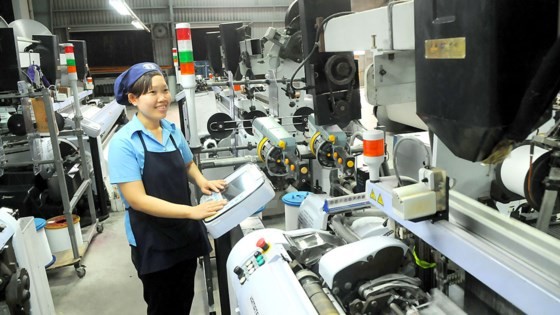
According to a representative of the HCMC Department of Industry and Trade, South Korea is now the fifth largest export market of Vietnam with turnover accounting for over five percent. The representative was speaking at a meeting discussing solutions to improve the competitive ability of Vietnamese goods in South Korea yesterday.
Explaining the turnover high growth rate, Ms. Trinh Thi Thu Hien, head of Goods Origin Division under the Export Import Department of the Ministry of Industry and Trade, said that VKFTA has worked to boost export of Vietnamese goods which South Korea needs and vice versa.
Businesses of the two countries have no direct contradiction so the export turnover of Vietnamese goods to the market has highly increased, she said.
In addition, Vietnamese firms have significantly improved goods packaging, designs, quality and types to suit South Korean consumers’ demand. The offering prices of Vietnamese goods are more competitive than Filipino, Chinese, Indonesian and Thai products.
Vietnamese firms have well taken advantage of tax incentives from the FTA, especially those exporting seafood, pepper, vegetable and fruit, footwear and vehicle components and accessories.
In HCMC, the most exported items are garment and textile accounting for 29 percent; computer, electronic products and accessories 28.9 percent; wood and wooden items 6 percent; seafood 5.9 percent and footwear 5.2 percent.
Moreover, they have also got the best out of the FTA to export to the EU. Vietnam-EU FTA has been signed and the EU has also signed FTA with South Korea. When importing materials from South Korea and exporting products to the EU market, businesses enjoy export tax incentives and vice versa.
Director of the HCMC Department of Industry and Trade Nguyen Huynh Trang said that Vietnam has signed 12 FTAs with 10 having taken effect. According to commitments, most of the signed FTAs will enter the phase of strong import tariffs cut or exemption in the phase of 2017-2020.
FTAs have brought domestic firms more chances to expand export market but tighter trade barriers.
The VKFTA has brought them not only many advantages but also barriers. South Korea has just applied preferential tax rates on products which local production is short. This does not create opportunities for businesses from other industries. For instance, Vietnamese beef products are imposed the import tariff rate of up to 32-45 percent.
Mr. Nguyen Quan Phuc, head of Export Import Management Department in HCMC, said that many businesses describe their goods in Vietnamese when making custom declaration, causing confusion and wrong export code application. As a result, their goods have been returned or exported without enjoying tax incentives.
Origin regulations have also limited the export volume of Vietnamese goods to South Korea as domestic material source has depended on import.
Many businesses at the meeting said that although the Ministry of Industry and Trade has permitted businesses to apply rules of self-certification but so far only two have been licensed to do so including Nestlte and Vinamilk.
Mr. Phuc said that implementation of the self-certification rule will be carefully considered and gradually broadened to prevent from affecting the prestige of genuine businesses and improve the competitive ability of Vietnamese businesses in South Korea.
The Vietnamese Government is speeding up negotiations to sign FTAs with the Philippines and Thailand to increase advantages for domestic businesses.
The Ministry of Industry and Trade will intensify organization of trade promotion activities for businesses of Vietnam and South Korea to have more opportunities to contact, learn about each other and sign cooperation agreements.
In the domestic market, the ministry will implement programs to assist local businesses to improve packaging, designs and quality of products through the distribution channel of Korean firms in Vietnam so that they can meet standards to attend Korean supply chains in the country and in the world.
























